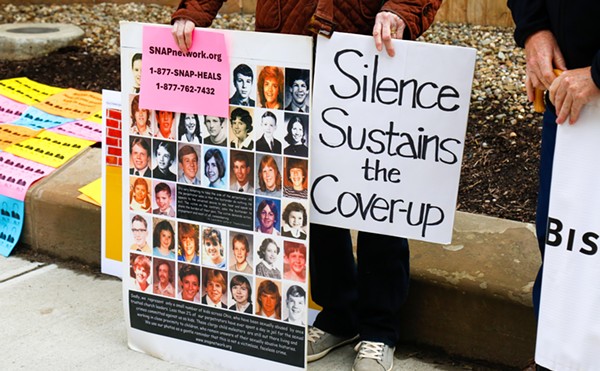"They've been a good help for me in really supporting my family," Bill Parker says. He's been out of work for eight months now. Five months ago, he made his first visit to the Calvary Lutheran Hunger Center. "It's not about pride; I've got a family. It's been difficult, and I count my blessings."
Parker smiles affably and says these monthly trips to the hunger center are sort of a bridge between losing work and finding it again. That's the intent of these places: Lend people in need a bit of assistance and they'll be better off in the long run -- less stress at home, more time for the job hunt, and the peace of mind that comes with a healthier diet.
The woman holding #17 hasn't gotten any closer to being called up. She settles in for the afternoon, waiting her turn because there's little else to do. More broadly speaking, the same morass awaits: Resources are down, but you've still got to eat. Her personal food stamp issuance was cut from $28 to $25 in November, which gets stretched to the point of absurdity once bills are paid and her family draws up the grocery list.
All of which is to say that the average, mostly well-off Cuyahoga County family doesn't have to confront literal pangs of hunger or the sorts of decisions that pit vegetables against, say, gasoline or your children's school supplies.
"As you continue to be poor for a longer period of time, that stuff (social safety nets, help from friends and family) starts disappearing. That's when the changes start really occurring in households," Irribarren says. "And we have a very high population of low-income people now."
Thing is, it takes a lot of time and money to be poor. And people who don't fall into that category typically don't grasp the reality of life as a hungry person. Of course, there's always the Food Stamp Challenge.
"I'm fucking starving." That's what celebrity chef Mario Batali said when he participated. And he probably was. "Rice and beans is in my lunch every day," he said at the time. Batali listed other recipes he made for dinners, but the amount of time planning and shopping, not to mention Batali's culinary expertise, isn't really a measuring stick for the single mom down the street.
Nor is really anything that Batali experiences. Things like the Food Stamp Challenge do little more than parody the real-life frustration of families who go hungry. It's not easy to think clearly when the emptiness of hunger sets in. Given a seven-day exercise in extreme budgeting, participants won't ever feel that void. And that's the physiological difference.
Public figures like Batali or Sen. Cory Booker (D-NJ) grasp headlines more than awareness for the plight of the poor. These are, after all, enticing human interest stories. But surely those headlines matter. A ridiculous quote from a celebrity chef will grab more eyes and ears than a swath of USDA stats and op-ed from the activist down the street.
Locally, though, FitzGerald's own endeavor didn't get nearly the attention that other public figures nabbed.
The county executive's week of oatmeal and cheeseburgers passed by without so much as a sniff from reporters. There certainly wasn't any open dialogue about pushing for increases in SNAP funding or redirecting allocations for Big Agriculture and the Farm Bill toward more local, sustainable food models. Not a word.
And the rally on Public Square last month? King and several dozen more food stamp users and advocates sounded the alarms for action. But everyone there already knew how dire the situation has become.
To distill one last myth about the whole endeavor, another point involves the simple fact that food stamp users comprise not only the homeless and the outright poor. County data wouldn't jump from SNAP rates of 8 percent to 22 percent in 14 years without some statistical creep from the middle class.
What's going to matter most is how the region as a whole - from the top down - responds.
In County Council Chambers, FitzGerald waxes political, which suits his role better than that recent spate of PR blips: "The war on the poor is not rhetorical...It's substantive, and this is a substantive policy that's going to be imposed on thousands of people in this county."
He was adding his voice to the discussion about the county's massive expenditure to phone thousands of SNAP-eligible residents and began ranting against Kasich. Given the tenor of the council presentation and the legislators' studied lines of debate, Fitz's input seemed brash. But surely something's gotta give among the region's powerful.
Down at the Public Square rally, as participants brace themselves against the bitter cold, South Euclid City Councilman Marty Gelfand stands before the statue of former Cleveland Mayor Tom Johnson. He's shivering, but he still manages to spill concern about the ripple effects of the federal cuts.
"The storekeepers in South Euclid and other communities around the area - they are their employees aren't getting that money for food at that place of business," he says. "And those employees, what are they going to do?"
A woman in the crowd interjects: "They're going to have to qualify for food stamps, like everyone else!"
In late December, Gelfand sponsored a resolution in his city opposing the federal cuts. It passed unanimously.
And that action kinda represents the limit of local government here. King, meanwhile, is not alone in saying that more is needed: "Passing a resolution is all well and good, but the ones passing those resolutions probably don't know what a person has to deal with. They can pass a resolution, but what does that mean to a person who's on that program?"
Everyone - the represented and the representatives alike - is looking for solutions. Dana Irribarren, speaking in her office at the Hunger Network's downtown headquarters, throws up her hands at times as she discusses The Problem. The number she's running on the computer before her aren't pleasant. She's been working with the region's hungry for decades, and the same axis of supply and demand is getting dosed by the same old IV of entropy. Same as it ever was.











